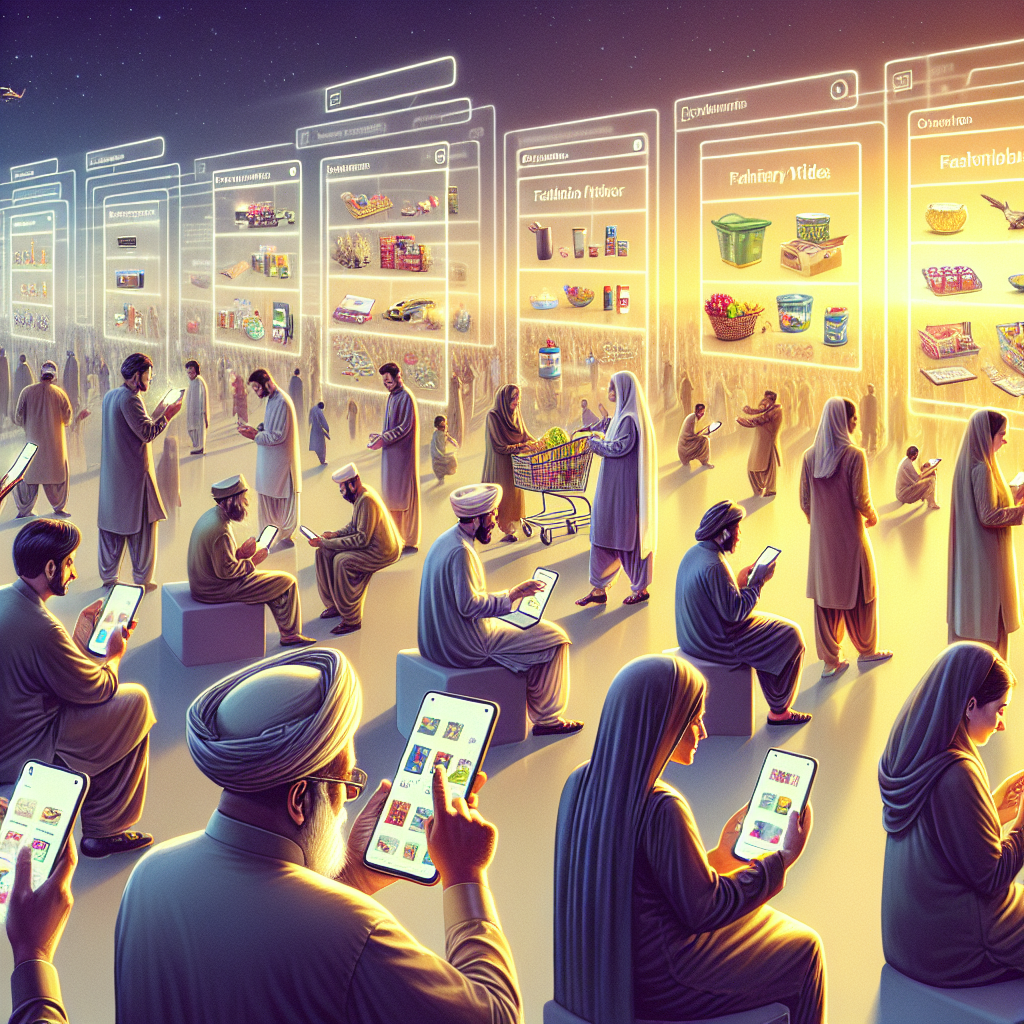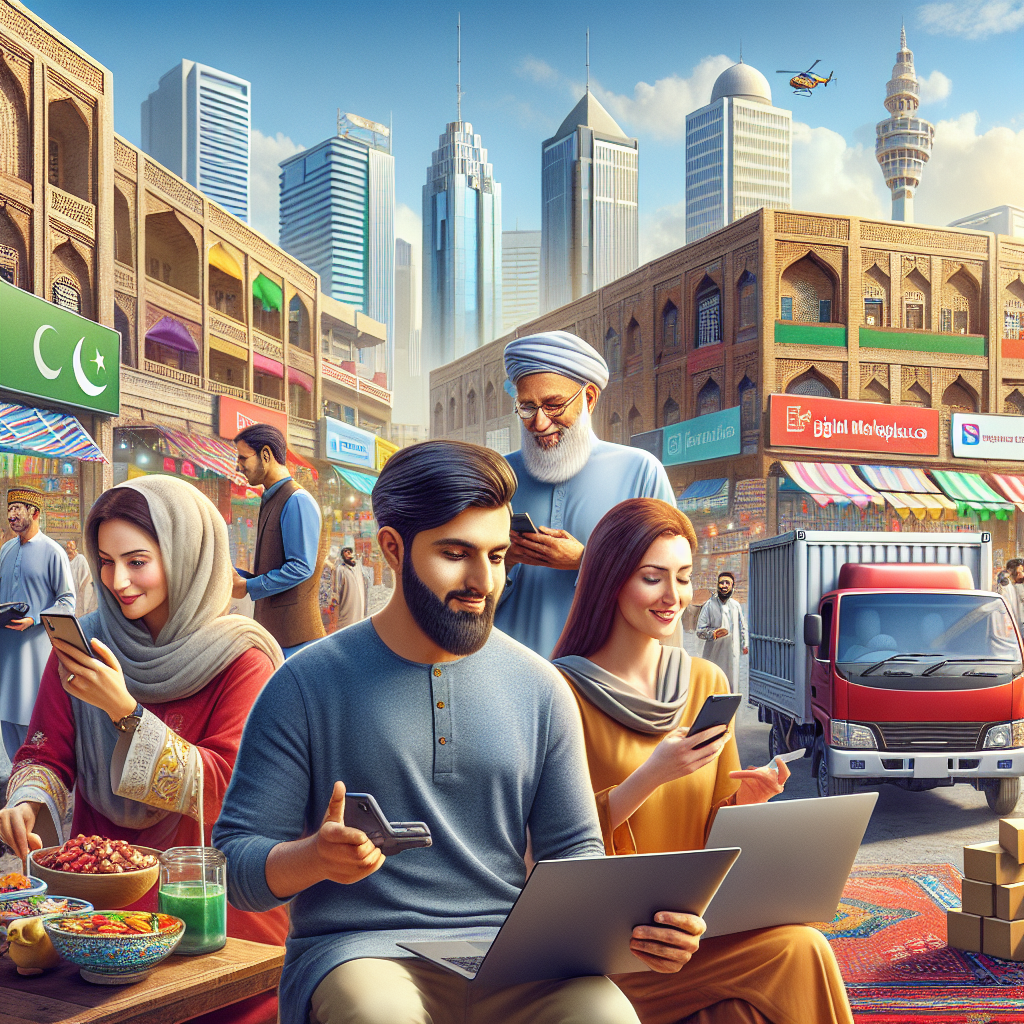The e-commerce landscape in Pakistan has witnessed a phenomenal transformation over the past decade. With increasing internet penetration, smartphone usage, and a burgeoning middle class, the country has embraced online shopping with open arms. The convenience of browsing through a myriad of products from the comfort of one’s home, coupled with attractive discounts and fast delivery options, has significantly boosted the popularity of online shopping platforms.
Today, Pakistan’s e-commerce sector is a vibrant and dynamic space, offering everything from electronics and fashion to groceries and home essentials. The market is flooded with a plethora of online shopping websites catering to diverse consumer needs. According to recent estimates, there are hundreds of online shopping websites in Pakistan, each vying for a share of the ever-growing digital marketplace.
At Cosmoso.shop, we pride ourselves on offering high-quality discounted items with free and fast shipping. Whether you’re looking for the latest gadgets, trendy apparel, or daily essentials, our platform ensures a seamless shopping experience. Shop Now!

The growth of online shopping sites in Pakistan has been nothing short of remarkable. Over the past few years, the country has seen a significant increase in the number of e-commerce platforms, driven by various factors including improved internet accessibility, rising smartphone adoption, and a growing trend of digital literacy among the population. This digital evolution has made it easier for consumers to explore and purchase products online, contributing to the rapid expansion of the e-commerce sector.
One of the major catalysts for this growth has been the convenience and variety offered by online shopping sites. Consumers now have access to a wider range of products than ever before, from local and international brands alike. This vast selection, combined with competitive pricing, has made online shopping an attractive option for many Pakistanis.
Another significant factor is the improvement in payment gateways and logistics services. With secure online payment options and efficient delivery systems, customers can now shop with confidence, knowing that their transactions are safe and that their orders will arrive promptly. This has helped build trust in online shopping, further fueling its growth.
The rise of social media platforms has also played a crucial role in the proliferation of e-commerce websites. Many businesses leverage social media to reach their target audience, promote their products, and drive traffic to their online stores. This synergy between social media and e-commerce has created a robust ecosystem that supports the continuous growth of online shopping in Pakistan.

In Pakistan, a variety of online shopping platforms have gained immense popularity due to their diverse product offerings, user-friendly interfaces, and reliable services. Among these, Daraz stands out as the largest and most well-known e-commerce site in the country. Acquired by Alibaba Group in 2018, Daraz offers a comprehensive range of products including electronics, fashion, groceries, and more, making it a one-stop-shop for many Pakistani consumers.
Another prominent platform is Homeshopping.pk, which has garnered a loyal customer base by focusing on electronics and gadgets. Known for its competitive prices and excellent customer service, Homeshopping.pk is a go-to site for tech enthusiasts looking for the latest gadgets and electronics.
Yayvo, operated by TCS, one of Pakistan’s leading courier companies, has also carved out a significant niche in the e-commerce market. With a strong emphasis on fast delivery and a wide range of products, Yayvo has become a trusted name for online shoppers seeking quick and reliable service.
For fashion aficionados, Limelight and Khaadi are two popular choices. Both brands have a strong online presence and offer a variety of clothing and accessories that cater to the latest trends and styles. Their user-friendly websites and attractive seasonal sales make them favorites among fashion-conscious consumers.
Other noteworthy mentions include Symbios.pk, known for its extensive range of electronics, and GOTO, which offers a diverse selection of products from multiple categories. These platforms have contributed significantly to the vibrant e-commerce landscape in Pakistan, providing consumers with numerous options to meet their shopping needs.

While mainstream online shopping platforms cater to a broad audience, niche marketplaces and specialized websites in Pakistan focus on specific product categories and target particular customer segments. These websites have developed a loyal following by offering specialized products that are often not available on larger e-commerce platforms.
One such website is Shophive, which is renowned for its extensive range of IT products, including laptops, desktops, software, and accessories. Shophive has become a trusted name among tech enthusiasts and professionals looking for reliable IT solutions.
Foodpanda is another specialized platform that has revolutionized the food delivery service in Pakistan. By partnering with various restaurants and eateries, Foodpanda provides a convenient way for customers to order food online and have it delivered to their doorstep. This platform has been particularly successful in urban areas, where the demand for quick and easy food delivery is high.
For beauty and personal care, Just4Girls.pk stands out as a dedicated platform for cosmetics and skincare products. Catering exclusively to female customers, Just4Girls.pk offers a wide range of high-quality beauty products from both local and international brands. The website’s focus on authenticity and customer satisfaction has earned it a strong reputation among beauty enthusiasts.
Bacha Party is a specialized website that targets parents looking for quality products for their children. From clothing and toys to school supplies and baby care items, Bacha Party provides a comprehensive shopping experience for parents who want the best for their kids. The platform’s user-friendly interface and attractive deals make it a popular choice among parents.
In the realm of fashion, Zebrs and Brands.pk offer exclusive collections of branded apparel and accessories. These websites cater to fashion-conscious consumers who seek premium quality products and designer labels. By focusing on high-end fashion, Zebrs and Brands.pk have successfully carved out a niche in the competitive e-commerce market.
These niche marketplaces and specialized websites not only diversify the e-commerce landscape in Pakistan but also provide consumers with tailored shopping experiences that meet their unique needs and preferences.
Despite the rapid growth of e-commerce in Pakistan, the sector faces several significant challenges that hinder its full potential. One of the primary issues is the lack of reliable logistics and delivery infrastructure. Many areas in Pakistan, especially rural regions, suffer from poor road networks and limited access to courier services. This not only delays deliveries but also increases the cost of shipping, making it less attractive for both sellers and buyers.
Another challenge is the low penetration of digital payment methods. While cash on delivery (COD) remains the most popular payment method, it poses risks for sellers, such as increased chances of order cancellations and return logistics complications. The limited use of credit and debit cards, coupled with a lack of trust in online transactions, further exacerbates this issue.
The e-commerce industry in Pakistan also grapples with regulatory and policy hurdles. Inconsistent regulations, high import duties, and inadequate consumer protection laws create a challenging environment for online businesses. These factors often discourage foreign investment and limit the ability of local startups to scale their operations effectively.
Internet connectivity remains another critical challenge. Although urban areas enjoy relatively stable internet access, many rural regions still struggle with unreliable and slow connections. This digital divide restricts the reach of e-commerce platforms, preventing them from tapping into a broader customer base.
Furthermore, there is a significant trust deficit between consumers and online retailers. Concerns over product quality, authenticity, and customer service deter many potential buyers from shopping online. The prevalence of counterfeit products and fraudulent websites has only added to this mistrust, making it imperative for e-commerce platforms to establish robust quality control measures and transparent customer service policies.
Addressing these challenges requires a concerted effort from all stakeholders, including the government, private sector, and consumers. By improving logistics, promoting digital payments, streamlining regulations, enhancing internet connectivity, and building consumer trust, Pakistan’s e-commerce landscape can unlock its full potential and contribute significantly to the country’s economic growth.

The future of online shopping in Pakistan looks promising, with a plethora of opportunities on the horizon. One of the key drivers of this growth is the increasing internet penetration. With more people gaining access to affordable and high-speed internet, the potential customer base for online retailers is expanding rapidly. Furthermore, the widespread adoption of smartphones is making it easier for people to shop online, even in remote areas.
Technological advancements are also playing a crucial role in shaping the future of e-commerce in Pakistan. The integration of artificial intelligence (AI) and machine learning (ML) in online platforms is enhancing the shopping experience by providing personalized recommendations and improving customer support through chatbots. Additionally, the use of big data analytics is helping businesses understand consumer behavior better, enabling them to tailor their offerings accordingly.
Another significant trend is the rise of social commerce. Leveraging social media platforms like Facebook, Instagram, and WhatsApp, businesses are reaching out to potential customers more effectively. Social media not only serves as a marketing tool but also acts as a direct sales channel, making the shopping experience more seamless and interactive.
The development of secure and convenient payment solutions is also expected to boost the e-commerce sector. With initiatives to promote digital wallets and mobile banking, consumers are gradually becoming more comfortable with cashless transactions. This shift is likely to reduce the reliance on cash on delivery and mitigate the associated risks.
Moreover, the government’s commitment to fostering a conducive environment for e-commerce is encouraging. Policies aimed at improving logistics infrastructure, reducing import duties, and protecting consumer rights are likely to attract more investments and stimulate growth in the sector.
As the ecosystem matures, we can expect a surge in the number of local startups and international players entering the market, further diversifying the range of products and services available to consumers. This competition will not only drive innovation but also lead to better pricing and quality of offerings.
In conclusion, the future of online shopping in Pakistan is bright, with numerous factors converging to propel the industry forward. Whether you’re a consumer looking for the best deals or a business aiming to tap into this burgeoning market, there has never been a better time to engage with Pakistan’s e-commerce sector. For those keen on experiencing high-quality products with free and fast shipping, Shop Now!
Leave a comment